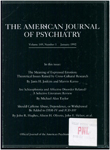Antisocial personality disorder in patients with substance abuse disorders: a problematic diagnosis?
Abstract
The authors' literature review suggests that the relationship between antisocial personality disorder and substance abuse is complex and not yet fully understood. The confusion regarding the relationship between the disorders may be magnified by the emphasis in DSM-III and DSM-III-R on behavioral criteria and their failure to require that antisocial behaviors exist independently of substance abuse. The DSM-III and DSM- III-R formulations of antisocial personality disorder may encompass two subgroups of substance abusers--"true" psychopathic individuals and symptomatic psychopaths with little psychopathy. Psychoneurotic symptoms and favorable treatment responses might be found more often in the latter group.
Access content
To read the fulltext, please use one of the options below to sign in or purchase access.- Personal login
- Institutional Login
- Sign in via OpenAthens
- Register for access
-
Please login/register if you wish to pair your device and check access availability.
Not a subscriber?
PsychiatryOnline subscription options offer access to the DSM-5 library, books, journals, CME, and patient resources. This all-in-one virtual library provides psychiatrists and mental health professionals with key resources for diagnosis, treatment, research, and professional development.
Need more help? PsychiatryOnline Customer Service may be reached by emailing [email protected] or by calling 800-368-5777 (in the U.S.) or 703-907-7322 (outside the U.S.).



